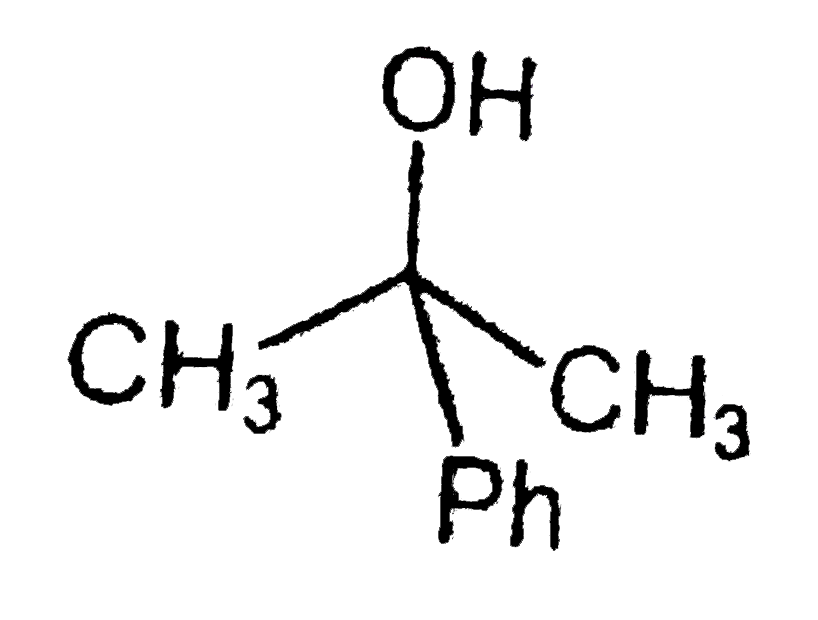A tertiary alcohol is obtained when Grignard reagent react with
Pentanone
Butanone
Propanone
all of these
The correct Answer is:D
To determine which compound yields a tertiary alcohol when reacted with a Grignard reagent, we need to analyze the nature of the compounds involved and the reaction mechanism.
1. Understanding Grignard Reagents:
- Grignard reagents are organomagnesium compounds represented as R-MgX, where R is an alkyl or aryl group, and X is a halogen. They act as strong nucleophiles.
2. Identifying the Reaction:
- Grignard reagents react with carbonyl compounds (aldehydes and ketones) to form alcohols. The type of alcohol formed (primary, secondary, or tertiary) depends on the structure of the carbonyl compound.
3. Analyzing the Options:
- The question provides four options:
1. Pentanone
2. Butanone
3. Propanone
4. All of the above
4. Determining the Type of Alcohol Formed:
- Propanone (Acetone): When a Grignard reagent reacts with propanone, the nucleophile attacks the carbonyl carbon, leading to the formation of a tertiary alcohol.
- Butanone: Similar to propanone, the reaction of butanone with a Grignard reagent also leads to the formation of a tertiary alcohol.
- Pentanone: The same mechanism applies here; the reaction with a Grignard reagent will yield a tertiary alcohol.
5. Conclusion:
- Since all three ketones (propanone, butanone, and pentanone) will react with a Grignard reagent to produce tertiary alcohols, the correct answer is option 4: All of the above.
Final Answer:
The correct answer is option 4: All of the above.
- Grignard reagents are organomagnesium compounds represented as R-MgX, where R is an alkyl or aryl group, and X is a halogen. They act as strong nucleophiles.
- Grignard reagents react with carbonyl compounds (aldehydes and ketones) to form alcohols. The type of alcohol formed (primary, secondary, or tertiary) depends on the structure of the carbonyl compound.
- The question provides four options:
1. Pentanone
2. Butanone
3. Propanone
4. All of the above
- Propanone (Acetone): When a Grignard reagent reacts with propanone, the nucleophile attacks the carbonyl carbon, leading to the formation of a tertiary alcohol.
- Butanone: Similar to propanone, the reaction of butanone with a Grignard reagent also leads to the formation of a tertiary alcohol.
- Pentanone: The same mechanism applies here; the reaction with a Grignard reagent will yield a tertiary alcohol.
- Since all three ketones (propanone, butanone, and pentanone) will react with a Grignard reagent to produce tertiary alcohols, the correct answer is option 4: All of the above.
The correct answer is option 4: All of the above.
Topper's Solved these Questions
- BOOK - MARVEL PUBLICATIONCHAPTER - ALCOHOL,PHENOLS AND ETHERS EXERCISE - Test your Grasp : Alcohols and Phenols40videos
ALCOHOL,PHENOLS AND ETHERS
- BOOK - MARVEL PUBLICATIONCHAPTER - ALCOHOL,PHENOLS AND ETHERS EXERCISE - Test your Grasp : Ethers30videos
ALCOHOL,PHENOLS AND ETHERS
- BOOK - MARVEL PUBLICATIONCHAPTER - ALDEHYDES,KETONES AND CARBOXYLIC ACIDSEXERCISE - CARBOXYLIC ACIDS198videos
ALDEHYDES,KETONES AND CARBOXYLIC ACIDS
Similar Questions
Knowledge Check
- Question 1 - Select One
Which of the following gives a tertiary alcohol when treated with Grignard reagent ?
AH−O||C−HB O ||CH3−C−HCO||CH3−C−CH3DNone of these - Question 2 - Select One
Alcohols react with Grignard reagent to form
AAlkanesBAlkenesCAlkynesDAll of these - Question 3 - Select One
Alcohols react with Grignard reagent to form
AAlkanesBAlkenesCAlkynesDAll of these
Primary alcohols are obtained by the reaction of Grignard reagent with
View SolutionAlcohols reacts with Grignard reagent to form
View SolutionAssertion: Hydroxyketones are not directly used in Grignard reaction.
Reason : Griganard reagnts react with hydroxyl group.View SolutionTertiary alcohol is obtained as major product in :
View SolutionGrignard reagents are singma- bonded organometallic compound. There exists covalent bond between carbon and magnesium atoms. Grignard reagent finds applications in the sysnthesis of variety of compounds. Gringnard reagent reacts as carbanion and the reaction of carbanion with the proton of an acid is acid- base reaction. Cabonyl compound (including ester) on interation with grignard reagent generates alkoxide ion and thus can be converted into alcohols. Grignard reagent react with almost all functional groups. Notable exceptions are tertiary amines aliphatic and aromatic C=C bonds.
Q. Which of the following combination of reactant can be used to prepare the following given compound?
 View Solution
View Solution

